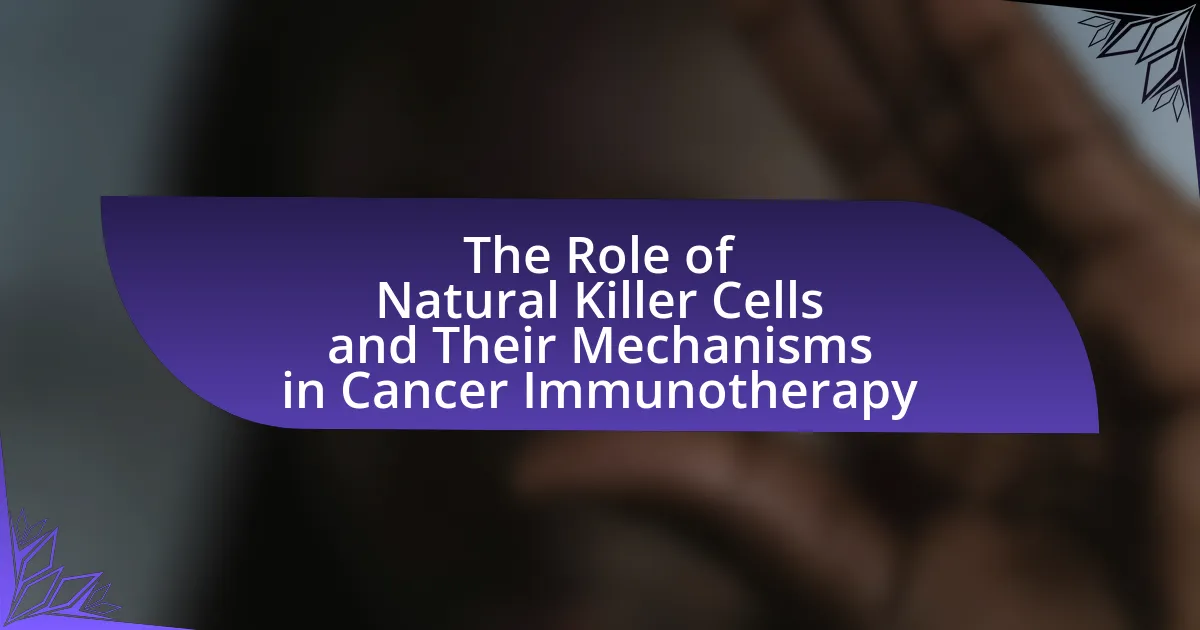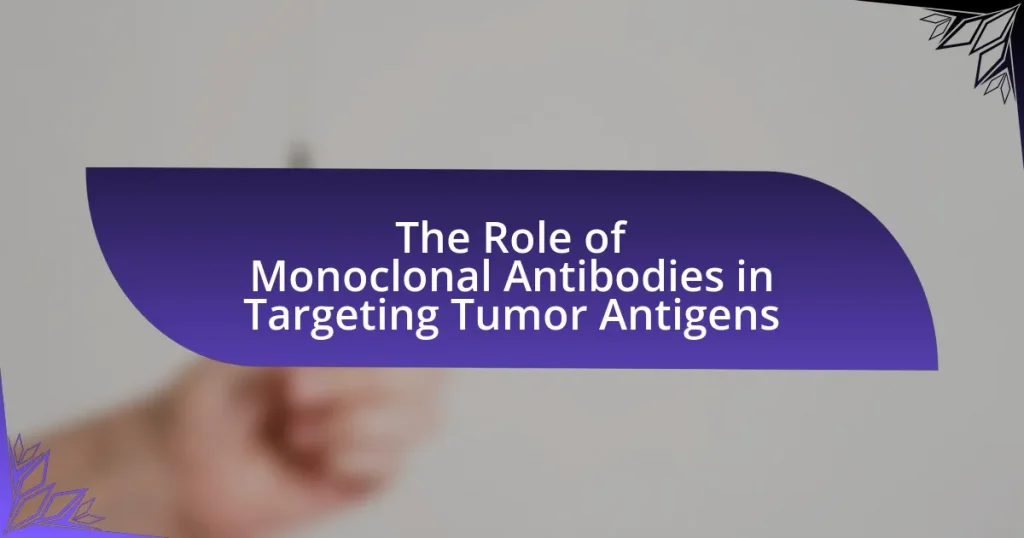Natural Killer (NK) cells are a vital component of the immune system, recognized for their ability to identify and eliminate tumor and virally infected cells without prior sensitization. This article explores the mechanisms by which NK cells function in cancer immunotherapy, including their cytotoxic activity, the role of activating and inhibitory receptors, and the influence of cytokines on their effectiveness. It also addresses the challenges NK cells face in the tumor microenvironment and highlights current therapeutic strategies, such as adoptive cell transfer and monoclonal antibody therapies, that enhance NK cell efficacy. Future directions for research focus on genetic engineering and combination therapies to improve NK cell responses in cancer treatment.
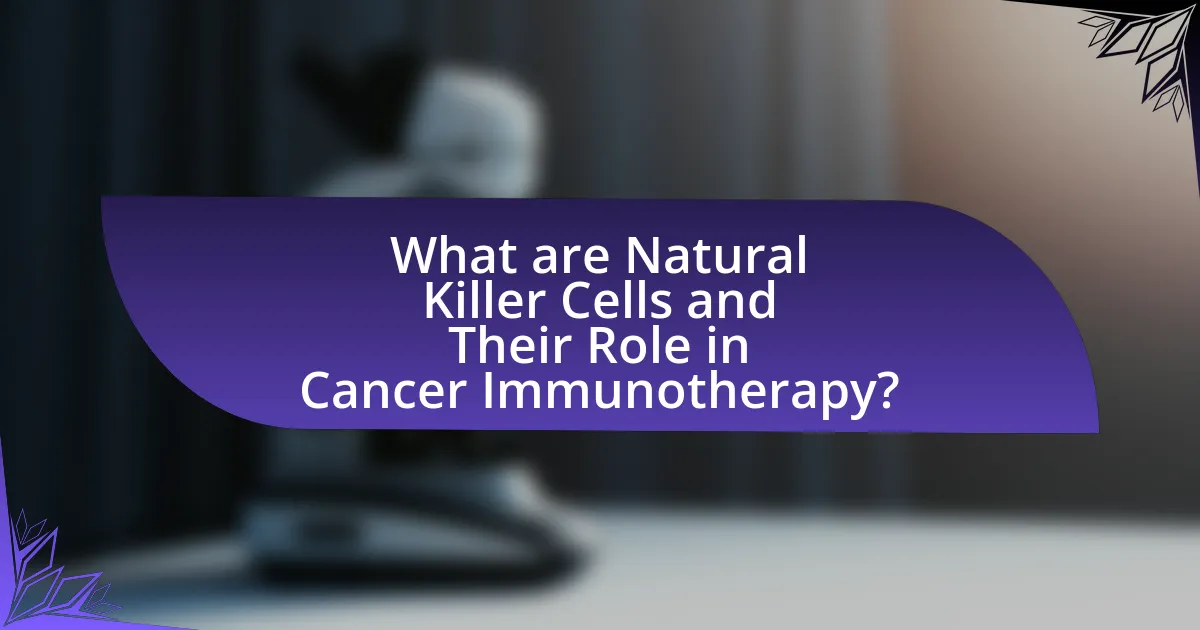
What are Natural Killer Cells and Their Role in Cancer Immunotherapy?
Natural Killer (NK) cells are a type of lymphocyte in the immune system that play a crucial role in the body’s defense against tumors and virally infected cells. They are characterized by their ability to recognize and kill these abnormal cells without prior sensitization, primarily through the release of cytotoxic granules containing perforin and granzymes. In cancer immunotherapy, NK cells are leveraged for their innate ability to target and destroy cancer cells, making them a promising therapeutic option. Clinical studies have demonstrated that enhancing NK cell activity can improve anti-tumor responses, as seen in therapies that utilize cytokines like interleukin-2 or adoptive cell transfer methods. These findings underscore the potential of NK cells in developing effective cancer treatments.
How do Natural Killer Cells function in the immune system?
Natural Killer (NK) cells function in the immune system by identifying and destroying infected or cancerous cells. They achieve this through a process called cytotoxicity, where NK cells release perforin and granzymes that induce apoptosis in target cells. NK cells are equipped with activating and inhibitory receptors that help them distinguish between healthy and abnormal cells; for instance, the presence of stress-induced ligands on infected or transformed cells activates NK cells, while normal cells express ligands that inhibit NK cell activity. This dual receptor system ensures that NK cells selectively target harmful cells while sparing healthy ones, contributing significantly to the innate immune response and tumor surveillance.
What are the key characteristics of Natural Killer Cells?
Natural Killer (NK) cells are a type of lymphocyte that play a crucial role in the innate immune response. Key characteristics of NK cells include their ability to recognize and kill virus-infected cells and tumor cells without prior sensitization, which distinguishes them from other immune cells. They express activating receptors, such as NKG2D and CD16, which facilitate the detection of stressed or transformed cells. Additionally, NK cells produce cytokines like interferon-gamma, enhancing the immune response. Their cytotoxic activity is mediated through the release of perforin and granzymes, leading to target cell apoptosis. Studies have shown that NK cells are vital in cancer immunotherapy, as their activation can improve anti-tumor responses, making them a focus of therapeutic strategies.
How do Natural Killer Cells identify and target cancer cells?
Natural Killer (NK) cells identify and target cancer cells primarily through the recognition of stress-induced ligands and the absence of major histocompatibility complex (MHC) class I molecules on the surface of tumor cells. NK cells possess activating receptors that bind to these ligands, which are often upregulated in cancerous cells, signaling the NK cells to initiate a cytotoxic response. Additionally, the lack of MHC class I molecules, which are typically present on healthy cells, allows NK cells to distinguish between normal and abnormal cells, leading to the elimination of cancer cells. This mechanism is supported by studies showing that tumors often evade immune detection by downregulating MHC class I, making them susceptible to NK cell-mediated lysis.
Why are Natural Killer Cells important in cancer treatment?
Natural Killer (NK) cells are crucial in cancer treatment due to their ability to recognize and eliminate tumor cells without prior sensitization. These innate immune cells can detect stressed or infected cells through various activating receptors, leading to the direct lysis of cancer cells. Research indicates that NK cells can also produce cytokines, such as interferon-gamma, which enhance the immune response against tumors. Studies have shown that higher levels of NK cell activity correlate with better clinical outcomes in cancer patients, underscoring their importance in immunotherapy strategies.
What advantages do Natural Killer Cells offer over other immune cells?
Natural Killer (NK) cells offer several advantages over other immune cells, primarily their ability to recognize and eliminate infected or cancerous cells without prior sensitization. This innate immune response allows NK cells to act quickly, providing a first line of defense against tumors and viral infections. Additionally, NK cells can produce a variety of cytokines, such as interferon-gamma, which enhances the immune response and recruits other immune cells to the site of infection or tumor. Their unique ability to distinguish stressed or abnormal cells through activating receptors, such as NKG2D, further enhances their effectiveness compared to T cells, which require antigen presentation for activation. Studies have shown that NK cells can effectively target and kill a wide range of tumor cells, making them a promising component in cancer immunotherapy strategies.
How do Natural Killer Cells contribute to tumor surveillance?
Natural Killer (NK) cells contribute to tumor surveillance by identifying and eliminating cancerous cells through their ability to recognize stressed or abnormal cells without prior sensitization. They achieve this by detecting changes in the expression of surface molecules, such as MHC class I downregulation, which is often seen in tumor cells. Research indicates that NK cells can release cytotoxic granules containing perforin and granzymes, leading to the apoptosis of these malignant cells. Additionally, NK cells produce cytokines like interferon-gamma, which enhances the immune response against tumors. Studies have shown that the presence of NK cells in tumors correlates with better patient outcomes, highlighting their critical role in monitoring and controlling tumor growth.
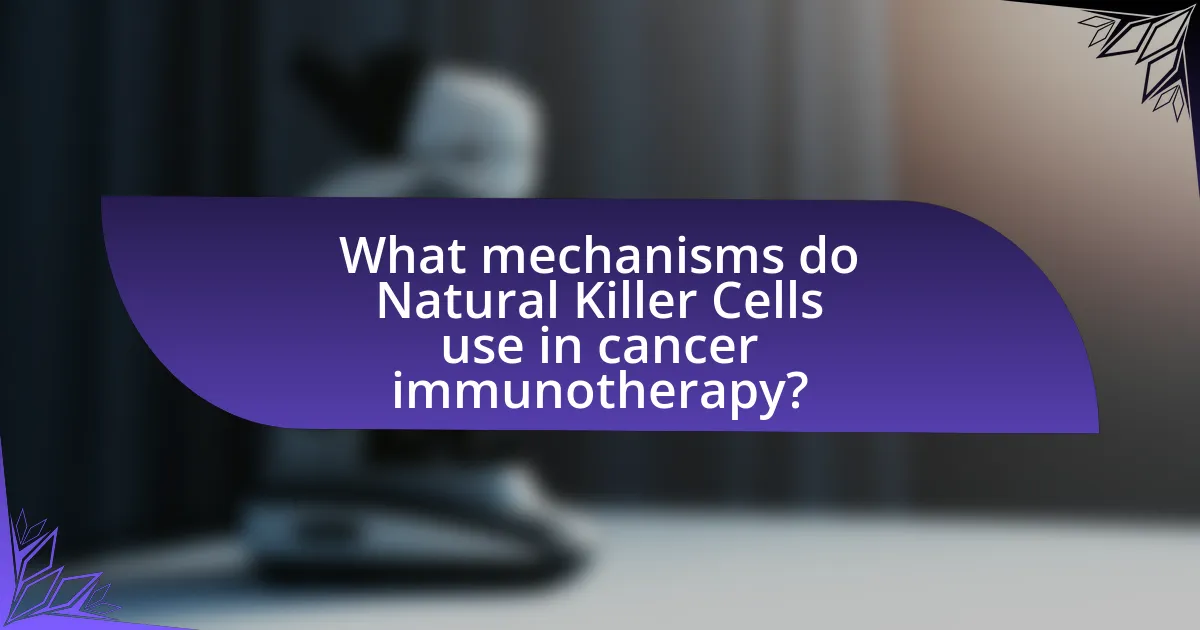
What mechanisms do Natural Killer Cells use in cancer immunotherapy?
Natural Killer (NK) cells utilize several mechanisms in cancer immunotherapy, primarily through direct cytotoxicity, cytokine production, and antibody-dependent cellular cytotoxicity (ADCC). Direct cytotoxicity occurs when NK cells recognize and kill tumor cells through the release of perforin and granzymes, leading to apoptosis of the cancer cells. Cytokine production involves the secretion of pro-inflammatory cytokines such as interferon-gamma (IFN-γ) and tumor necrosis factor-alpha (TNF-α), which enhance the immune response against tumors. Additionally, NK cells can engage in ADCC by binding to antibodies that are attached to tumor cells, facilitating the destruction of these cells. These mechanisms have been validated in various studies, demonstrating the effectiveness of NK cells in targeting and eliminating cancer cells in immunotherapeutic approaches.
How do Natural Killer Cells recognize and kill tumor cells?
Natural Killer (NK) cells recognize and kill tumor cells primarily through the detection of stress-induced ligands and the absence of major histocompatibility complex (MHC) class I molecules on the surface of these cells. NK cells possess activating receptors, such as NKG2D, that bind to ligands overexpressed on tumor cells, signaling the NK cells to initiate cytotoxic activity. Additionally, the lack of MHC class I molecules, which are often downregulated in tumor cells to evade T-cell recognition, triggers NK cell activation through inhibitory receptors, leading to the release of cytotoxic granules containing perforin and granzymes that induce apoptosis in the tumor cells. This mechanism is supported by studies showing that NK cells can effectively target and eliminate tumor cells lacking MHC class I, highlighting their role in immune surveillance and cancer immunotherapy.
What role do activating and inhibitory receptors play in this process?
Activating and inhibitory receptors on natural killer (NK) cells play crucial roles in regulating their activity during cancer immunotherapy. Activating receptors, such as NKG2D and CD16, enhance NK cell cytotoxicity against tumor cells by recognizing stress-induced ligands and antibody-coated targets, respectively. In contrast, inhibitory receptors, like KIRs and NKG2A, prevent NK cell activation by recognizing self-MHC molecules, ensuring that healthy cells are spared from destruction. The balance between signals from activating and inhibitory receptors determines the overall response of NK cells to cancer cells, influencing their effectiveness in immunotherapy. This balance is critical, as studies have shown that a higher ratio of activating to inhibitory receptor engagement correlates with improved NK cell-mediated tumor eradication.
How do cytokines influence the activity of Natural Killer Cells?
Cytokines significantly enhance the activity of Natural Killer (NK) cells by promoting their proliferation, activation, and cytotoxic functions. For instance, interleukin-2 (IL-2) and interleukin-15 (IL-15) are crucial cytokines that stimulate NK cell growth and increase their ability to kill tumor cells. Research has shown that IL-2 can boost NK cell cytotoxicity and promote the production of other cytokines, while IL-15 is essential for NK cell survival and homeostasis. Additionally, cytokines like interferon-gamma (IFN-γ) can further activate NK cells, enhancing their response to infected or malignant cells. These interactions illustrate the pivotal role of cytokines in modulating NK cell functions, which is vital for effective cancer immunotherapy.
What are the challenges faced by Natural Killer Cells in cancer therapy?
Natural Killer (NK) Cells face several challenges in cancer therapy, primarily including tumor evasion mechanisms, limited persistence in the tumor microenvironment, and insufficient activation. Tumors can develop strategies to evade NK cell recognition, such as downregulating major histocompatibility complex (MHC) molecules or secreting immunosuppressive factors. Additionally, NK cells often exhibit reduced survival and functionality in the hostile tumor microenvironment, which is characterized by hypoxia and high levels of inhibitory cytokines. Studies have shown that these factors significantly impair the effectiveness of NK cell-based therapies, highlighting the need for strategies to enhance NK cell activation and persistence in cancer treatment.
How do tumor microenvironments affect Natural Killer Cell function?
Tumor microenvironments significantly impair Natural Killer (NK) cell function by creating conditions that inhibit their activation and cytotoxicity. These environments often exhibit high levels of immunosuppressive factors, such as transforming growth factor-beta (TGF-β) and interleukin-10 (IL-10), which can downregulate the expression of activating receptors on NK cells and promote their apoptosis. Additionally, the presence of tumor-associated macrophages and regulatory T cells further contributes to the suppression of NK cell activity, leading to reduced tumor surveillance and control. Studies have shown that in solid tumors, the altered metabolic state and hypoxic conditions can also hinder NK cell proliferation and function, ultimately allowing tumors to evade immune detection.
What strategies are being developed to enhance Natural Killer Cell efficacy?
Strategies being developed to enhance Natural Killer (NK) cell efficacy include the use of cytokine therapies, genetic modifications, and immune checkpoint inhibitors. Cytokine therapies, such as interleukin-2 and interleukin-15, have been shown to promote NK cell proliferation and activation, thereby increasing their cytotoxic potential against tumors. Genetic modifications, including the engineering of NK cells to express chimeric antigen receptors (CARs), allow for targeted recognition and destruction of cancer cells. Additionally, immune checkpoint inhibitors, which block inhibitory receptors on NK cells, can enhance their activity by preventing tumor-induced suppression. These approaches are supported by clinical studies demonstrating improved outcomes in cancer patients receiving NK cell-based therapies.
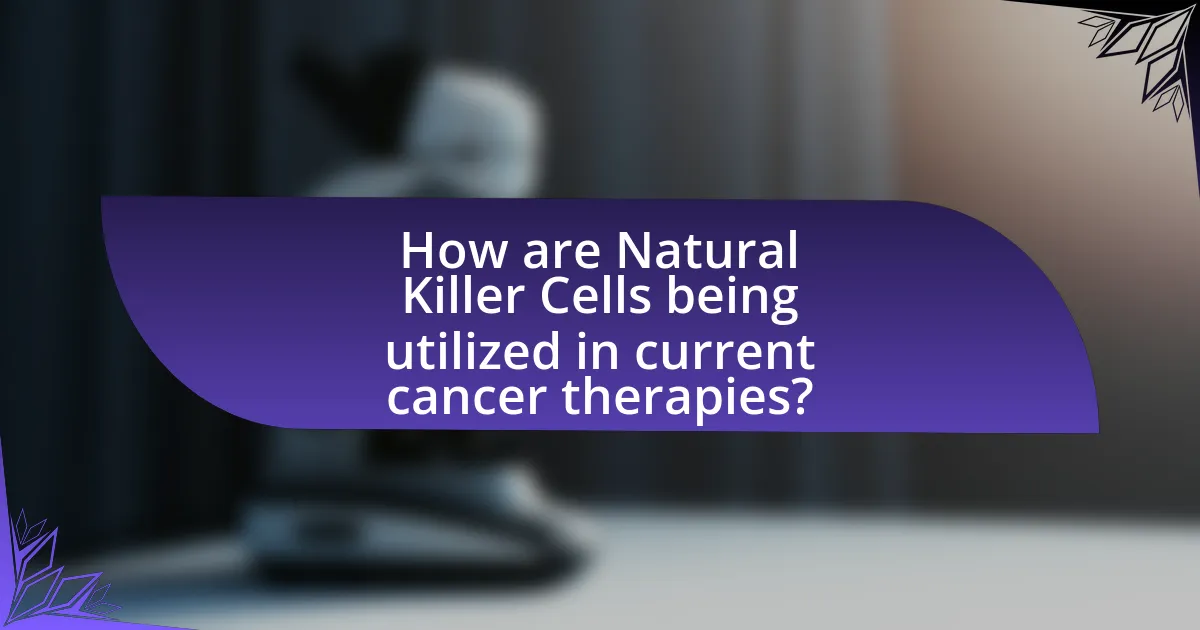
How are Natural Killer Cells being utilized in current cancer therapies?
Natural Killer (NK) cells are being utilized in current cancer therapies primarily through adoptive cell transfer and immunotherapy approaches. These therapies harness the innate ability of NK cells to recognize and eliminate tumor cells without prior sensitization. For instance, clinical trials have demonstrated that engineered NK cells, such as those modified with chimeric antigen receptors (CARs), can effectively target specific cancer antigens, leading to significant tumor regression in patients with hematological malignancies. Additionally, the use of cytokines like interleukin-2 (IL-2) enhances NK cell activity and proliferation, further improving therapeutic outcomes. Studies have shown that patients receiving NK cell-based therapies exhibit increased survival rates and reduced tumor burden, validating the efficacy of these approaches in cancer treatment.
What types of therapies incorporate Natural Killer Cells?
Therapies that incorporate Natural Killer (NK) cells include adoptive cell transfer, monoclonal antibody therapies, and immune checkpoint inhibitors. Adoptive cell transfer involves the infusion of activated NK cells into patients to enhance anti-tumor responses. Monoclonal antibody therapies, such as those targeting CD16, facilitate NK cell activation and tumor cell lysis. Immune checkpoint inhibitors can enhance NK cell activity by blocking inhibitory signals, thereby promoting their function against cancer cells. These therapies leverage the innate ability of NK cells to recognize and destroy malignant cells, contributing to improved outcomes in cancer treatment.
How do adoptive cell transfer therapies work with Natural Killer Cells?
Adoptive cell transfer therapies utilizing Natural Killer (NK) cells involve the extraction, expansion, and reinfusion of these immune cells to enhance the body’s ability to combat cancer. In this process, NK cells are isolated from a patient or a donor, cultured in vitro to increase their numbers, and activated to improve their cytotoxic capabilities against tumor cells. Studies have shown that expanded NK cells can effectively target and kill cancer cells through mechanisms such as the release of cytotoxic granules and the production of cytokines, which can inhibit tumor growth and promote immune responses. For instance, research published in “Nature Reviews Immunology” highlights that NK cells can recognize and eliminate tumor cells without prior sensitization, making them a promising tool in immunotherapy.
What is the role of monoclonal antibodies in enhancing Natural Killer Cell activity?
Monoclonal antibodies enhance Natural Killer (NK) cell activity by targeting specific antigens on tumor cells, thereby facilitating the recognition and destruction of these cells. These antibodies can engage NK cells through mechanisms such as antibody-dependent cellular cytotoxicity (ADCC), where the Fc region of the antibody binds to Fc receptors on NK cells, leading to the activation of NK cell functions. Studies have shown that monoclonal antibodies like trastuzumab and rituximab significantly improve NK cell-mediated lysis of cancer cells, demonstrating their effectiveness in cancer immunotherapy.
What are the future directions for Natural Killer Cell research in cancer immunotherapy?
Future directions for Natural Killer (NK) cell research in cancer immunotherapy include enhancing their efficacy through genetic engineering, improving their persistence in the tumor microenvironment, and combining NK cell therapies with other immunotherapeutic approaches. Genetic modifications, such as CAR-NK cells, have shown promise in increasing specificity and cytotoxicity against cancer cells. Research indicates that optimizing the tumor microenvironment can enhance NK cell survival and function, as evidenced by studies demonstrating that certain cytokines can improve NK cell activity. Additionally, combining NK cell therapies with checkpoint inhibitors or monoclonal antibodies may lead to synergistic effects, as seen in preclinical models where dual therapies resulted in improved tumor control.
How can genetic engineering improve Natural Killer Cell responses?
Genetic engineering can enhance Natural Killer (NK) cell responses by modifying their receptors and signaling pathways to improve their ability to recognize and eliminate cancer cells. Techniques such as CRISPR-Cas9 allow for precise alterations in NK cell genes, enabling the expression of chimeric antigen receptors (CARs) that target specific tumor antigens. Research has shown that CAR-NK cells exhibit increased cytotoxicity against various cancers, including leukemia and solid tumors, by directly engaging with malignant cells. For instance, a study published in “Nature Biotechnology” by Liu et al. demonstrated that engineered NK cells with CARs targeting CD19 significantly improved anti-tumor activity in patients with B-cell malignancies. This evidence supports the potential of genetic engineering to optimize NK cell functionality in cancer immunotherapy.
What potential do combination therapies hold for enhancing Natural Killer Cell effectiveness?
Combination therapies have significant potential for enhancing Natural Killer (NK) cell effectiveness in cancer immunotherapy. By integrating multiple therapeutic modalities, such as checkpoint inhibitors, cytokines, or monoclonal antibodies, these approaches can synergistically boost NK cell activation, proliferation, and cytotoxicity against tumor cells. For instance, studies have shown that combining interleukin-2 (IL-2) with anti-PD-1 antibodies can enhance NK cell responses, leading to improved tumor control in preclinical models. This synergy is supported by evidence indicating that checkpoint blockade can relieve inhibitory signals on NK cells, thereby augmenting their anti-tumor activity.
What practical considerations should be taken into account when using Natural Killer Cells in cancer treatment?
When using Natural Killer (NK) cells in cancer treatment, practical considerations include the source of NK cells, their activation status, and the tumor microenvironment. The source of NK cells can be autologous (from the patient) or allogeneic (from a donor), which affects compatibility and potential for graft-versus-host disease. The activation status of NK cells is crucial, as they must be adequately stimulated to effectively target and kill cancer cells; this can be achieved through cytokines or other agents. Additionally, the tumor microenvironment can inhibit NK cell function, necessitating strategies to enhance their activity, such as combining NK cell therapy with immune checkpoint inhibitors. These considerations are supported by studies indicating that the efficacy of NK cell therapies can be significantly influenced by these factors, highlighting the need for tailored approaches in clinical applications.
